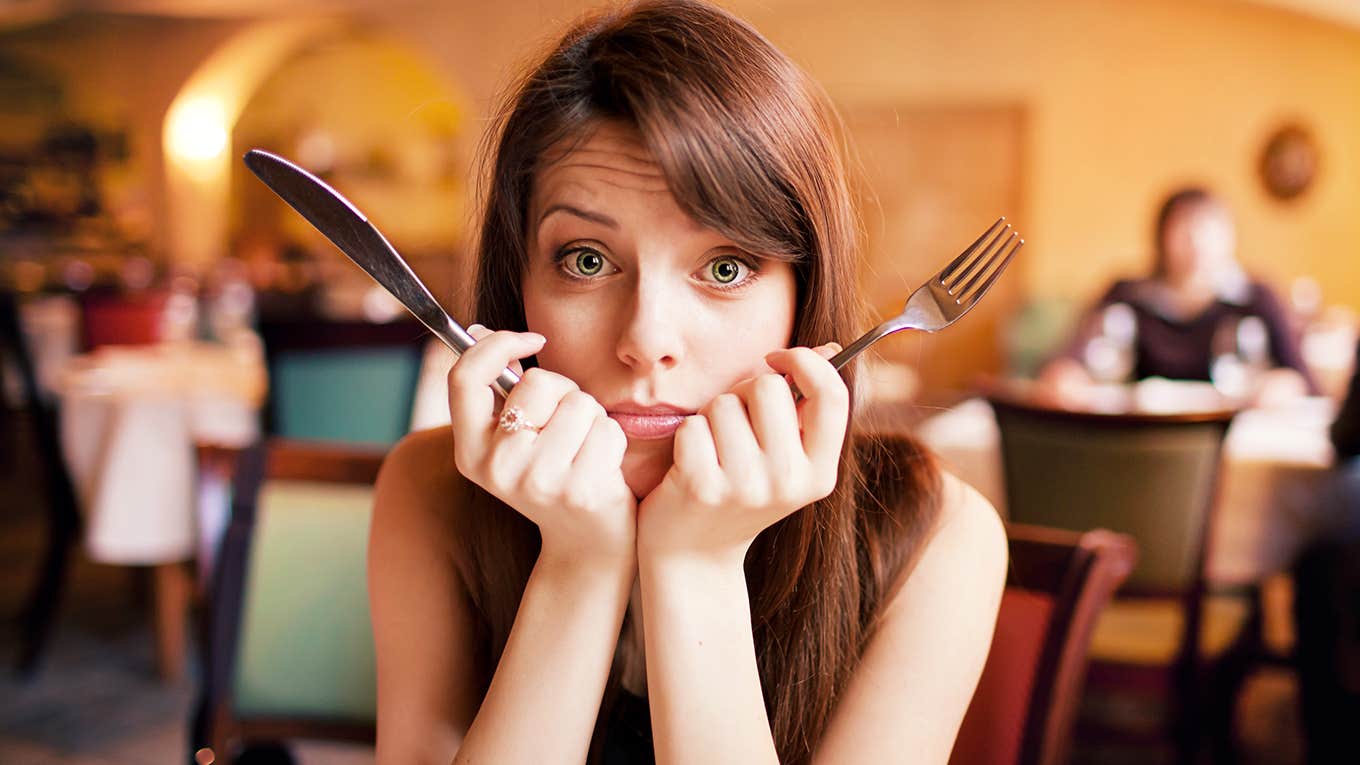What It's Like To Have A Messed Up Relationship With Food
I need calories to exist but I don’t want to exist if there are calories.
 AlikeYou | Shutterstock
AlikeYou | Shutterstock By Laura Herndon
I stare at the food on my plate. I mentally count the calories. I calculate the carbs.
I push my food around to make it look like I’ve eaten more than I have.
I look around the room. I’m thankful no one notices.
Later that night, I eat an entire frozen pizza and two pints of ice cream. Then, I take laxatives to push the food through my system quickly.
My stomach hurts. I’m cramping and curled into a ball. Somehow... I relish in the pain since that means the calories are leaving my body.
This vicious cycle began in my early teen years and continued into adulthood. This is my messed up relationship with food.
RELATED: What They Don't Tell You About Battling An Eating Disorder
In order to combat my issues, I’ve done almost everything possible. I’ve tried the cabbage soup diet — the gas was terrible. I tried South Beach — I lost 4 lbs. And I tried Keto — I lost 26 lbs the first time and 32 lbs the second. However, I gained every pound back.
So now, I am prompted to share my story of disordered eating with others.
This morning, I was standing in front of the refrigerator, trying to choose between an energy drink and fruit to satisfy my hunger. The energy drink won. It’s one of many rules and restrictions I live by.
Each day, I go on to break more rules out of defiance. When I eat bread, I think I’m winning. But the next morning, as I’m retching over the toilet, expelling the oatmeal I’ve eaten, I know that the reality is different.
Currently, I’m under the care of a therapist, and my primary care doctor is aware of my anorexia.
Yet, how can I be anorexic when I’m not skinny? It seems counterintuitive, right? But it’s not.
Disordered eating affects every person who has ever seen an ad in a magazine and thought, “I want to look like that.”
My therapist says my issues may have developed from childhood sexual abuse. But I also have friends who model that developed anorexia — there’s not just one reason behind eating disorders. Perhaps that’s why I choose to spend my time behind the lens rather than in front of it.
The truth is it doesn’t matter who you are. From thin to fat people, anyone can have an unhealthy relationship with food.
And how ironic is my addiction to food? I may as well develop an addiction to air or water because we need food to live. I need calories to exist but I don’t want to exist if there are calories. A certain number of calories equals pounds and pounds are fat and if I’m fat... if I’m fat, then what?
As a society, we treat fat people with such derision.
I’ve developed disordered eating in order to control my body because a monster defiled it in my childhood. Then, I had graduated to restricting food or purging to control weight. I’d give myself diarrhea to be considered more desirable.
I abuse my body in order to be beautiful. How messed up is that?
While I still struggle with disordered eating and intrusive thoughts, I’m very happy to say my treatment plan is working. One of the things that help me is to ask myself, “Who cares if I am fat?” because size doesn’t matter. You can be healthy at any size. In fact, there’s an entire movement online for just that reason.
If you recognize you have an unhealthy relationship with food, restrict yourself, or binge and purge, please seek help. It’s out there.
Lastly, know you are beautiful. You are special just as you are. You are amazing as you are. And, most importantly, you are worthy as you are.
Eating disorders are very common. According to the ANAD (Association of Anorexia Nervosa and Associated Disorders), eating disorders affect 9 percent of the population worldwide, and 28.8 million Americans will have an eating disorder in their lifetime. Eating disorders disproportionately affect BIOPC, LGBTQ+, and people with disabilities. Second to only opioid overdose, eating disorders are among the deadliest mental illnesses with 10,200 deaths each year as the direct result of an eating disorder — that’s one death every 52 minutes.
If you or a loved one are struggling with disordered eating, contact the National Eating Disorder Helpline’s toll-free phone number: 1-800-931-2237.
RELATED: How Eating Disorders Are Impacted By Quarantine Stress & What You Can Do To Cope
Anna Laura Herndon is a writer, advocate, and creator of Rants of a Virgo, an essay site. She writes about love, relationships, LGBTQ+ issues, and current events.

